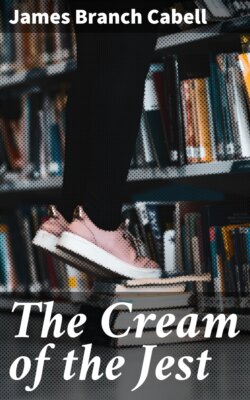Читать книгу The Cream of the Jest - James Branch Cabell - Страница 4
На сайте Литреса книга снята с продажи.
ОглавлениеII
Table of Contents
Wherein a Clerk Appraises a Fair Country
Table of Contents
Horvendile peered out over broad rolling uplands.... He viewed a noble country, good to live in, rich with grain and metal, embowered with tall forests, and watered by pleasant streams. Walled cities it had, and castles crowned its eminencies. Very far beneath Horvendile the leaded roofs of these fortresses glittered in sunlight, for Storisende guards the loftiest part of the province.
And the people of this land—from its lords of the high, the low, and the middle justice, to the sturdy whining beggars at its cathedral doors—were not all unworthy of this fair realm. Undoubtedly, it was a land, as Horvendile whimsically reflected, wherein human nature kept its first dignity and strength; and wherein human passions were never in a poor way to find expression with adequate speech and action.
Now, from the field below, a lark rose singing joyously. Straight into the air it rose, and was lost in the sun’s growing brilliance; but you could hear its singing; and then, as suddenly, the bird dropped to earth. No poet could resist embroidery on such a text.
Began Horvendile straightway: “Quan vey la laudeta mover”—or in other wording:
“When I behold the skylark move in perfect joy toward its love the sun, and, growing drunk with joy, forget the use of wings, so that it topples from the height of heaven, I envy the bird’s fate. I, too, would taste that ruinous mad moment of communion, there in heaven, and my heart dissolves in longing.
“Alas! how little do I know of love!—I, who was once deluded by the conceit that I was all-wise in love. For I am unable to put aside desire for a woman whom I must always love in vain. She has bereft me of hope. She has robbed me of my heart, of herself, and of all joy in the world, and she has left me nothing save dreams and regrets.
“Never have I been able to recover my full senses since that moment when she first permitted me to see myself mirrored in her bright eyes. Hey, fatal mirrors! which flattered me too much! for I have sighed ever since I beheld my image in you. I have lost myself in you, like Narcissus in his fountain.”
Thus he lamented, standing alone among the turrets of Storisende. Now a troop of jongleurs was approaching the castle—gay dolls, jerked by invisible wires, the vagabonds seemed to be, from this height.
“More merry-makers for the marriage-feast. We must spare no appropriate ceremony. And yonder Count Emmerick is ordering the majordomo to prepare peacocks stuffed with beccaficoes, and a pastry builded like a palace. Hah, my beautiful fantastic little people, that I love and play with, and dispose of just as I please, it is time your master shift another puppet.”
So Horvendile descended, still poetizing: “Pus ab mi dons no m pot valer”—or in other wording:
“Since nothing will avail to move my lady—not prayers or righteous claims or mercy—and she desires my homage now no longer, I shall have nothing more to say of love. I must renounce love, and abjure it utterly. I must regard her whom I love as one no longer living. I must, in fine, do that which I prepare to do; and afterward I must depart into eternal exile.”
